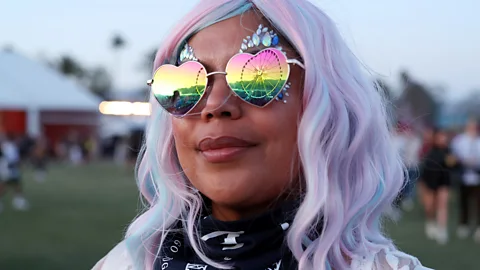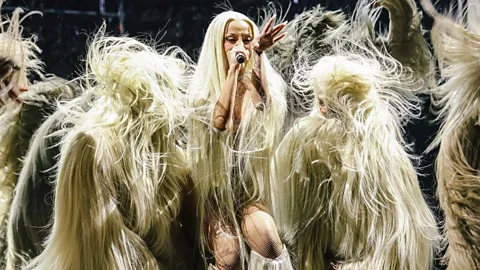Coachella 2024: What's the future for the US festival?
 Getty Images
Getty ImagesAs sound issues and indifferent crowds dogged its first weekend, we ask what the future holds for the US's flagship music festival.
Like all major music festivals, but perhaps to an even greater extent, Coachella isn't solely about music. Held every year over consecutive April weekends in the vast grounds of the Empire Polo Club in Indio, California, it has become a global focal point for fashion, celebrity and brand activations: this year's "partners" are a roll call of household names including BMW, Coca-Cola, Heineken, Neutrogena and YouTube. "In terms of pushing the needle in pop culture and people's [desire] to attend, I believe Coachella is the most important music festival in the US and maybe the world," Hugh McIntyre, a music journalist with Forbes, tells the BBC.
However, the latest iteration of the Coachella Valley Music and Arts Festival – to use the event's full title – doesn't seem like the sleek machine of previous years. Soon after the first weekend began on 12 April, reports of mishaps and misfires began trickling on to social media. On day one, performers including Sabrina Carpenter, The Japanese House and Lana Del Rey battled persistent sound issues including microphones cutting out. Then on day two, Grimes's DJ set was so glitchy that she apologised for "major technical difficulties" afterwards, and Blur were met with crushing indifference. At one point, the band's frontman Damon Albarn even tried to rouse the crowd by saying: "You're never seeing us again so you might as well sing it." Music journalist Rhian Daly, who was at Coachella last weekend, says that while Del Rey and fellow headliners Tyler, the Creator and Doja Cat "put in great sets at the top of the bill", the crowds "were largely underwhelming both in size and response".
Sadly, this year's event began attracting negative publicity even before the doors opened last Friday. In January, SFGate reported that Coachella 2024 was beset by the festival's slowest ticket sales in a decade. Things picked up, but according to Billboard, only 80% of the 250,000 tickets available sold out before the festival began, which is "14%-17% down" on last year. However, Billboard noted that even with this shortfall, "Coachella remains the most attended and highest-grossing annual festival in North America".
Like other top festivals, Coachella is struggling to attract punters in part because of the cost. This year, the cheapest three-day general admission pass is priced at $499 plus fees – the same as in 2023, though $50 more than in 2022. "But it's important to remember that for most people, it's not necessarily the ticket price that is prohibitive," McIntyre says. "It's more the cost of getting to California and accommodation once you're there." Provided you have access to a vehicle, you can purchase one of Coachella's "car camping" spots for an additional $150: this flat fee covers as many people as you can fit in a tent. If not, you'll have to pay for a hotel or other accommodation in the Indio vicinity, then fork out for transport to the Empire Polo Club each day. Once you factor in the cost of food and drinks on site, McIntyre says a Coachella weekender can "easily run into thousands of dollars per person".
 Getty Images
Getty ImagesOn top of this, Coachella's reputation as a haven for influencers has perhaps given it a bit of an image problem. "There's a big feeling of needing to be 'seen' at Coachella, which I don't think is quite the same at any UK music festival," says Daly. "You might want to show off the fact you managed to get a ticket to Glastonbury, but with Coachella, it feels more about status and likes." Though "festival fashion" becomes a big search term in the UK every summer, Daly believes there's more pressure to dress the part at Coachella. "People put a lot of time, energy and money into curating their looks for the weekend," she says.
All major music festivals face the same uphill struggle at a time when punters are feeling the pinch. Billboard reports that rivals including New York's Governors Ball, which takes place in June, and Chicago's Lollapalooza, which follows in August, also have tickets left. However, it is arguable that as the market leader, Coachella should have something of a head start. Editor and writer Courtney E Smith, author of Record Collecting for Girls, believes the California mega-festival is being impeded by "the slow decentralisation" of music. Because fans have access to more artists than ever before in the streaming era, traditional industry gatekeepers like radio stations and record labels hold less sway. For this reason, performers with truly universal appeal – the kind Coachella needs to guarantee a sell-out – are increasingly few and far between.
'A transformational period'
This year's headliners – Lana Del Rey, Tyler, the Creator and Doja Cat – are all massive names, but Smith believes they may not have captured the collective imagination to the same extent as previous superstar bookings. "There is no Lady Gaga, Beyoncé, Bad Bunny or Harry Styles this year," she says. Programming an event of Coachella's scale is an incredibly tricky, ever-shifting balancing act. In the past, Coachella has faced similar criticisms to many other music festivals – namely, that its line-ups are too white and male-dominated. Though there is still room for improvement in this regard, bookers have taken steps to improve the festival's diversity in recent years. In 2018, Beyoncé became the first black female artist to headline; then the following year, Ariana Grande became only the fourth female headliner of any ethnicity since Coachella began in 1999. (At the time, the others were Lady Gaga and Björk, who did so twice.)
But because Coachella takes place early in the festival season, its bookers have always given themselves the extra challenge of "setting trends" on the live music scene. "The line-up always introduces the best of the year for the rest of the year," Katy Perry opined in 2015, a view Smith broadly agrees with. "The bookers are known for bumping interesting acts to top spots and reuniting bands," she says. But in this respect, their midas touch may be waning: last weekend's much-hyped comeback performance from No Doubt – the band's first in nine years – wasn't greeted quite as rapturously as organisers might have hoped.
More like this:
When any Coachella line-up is unveiled, it becomes a talking point online. In 2017, the festival's co-founder Paul Tollett caused raised eyebrows when he told The New Yorker that, hypothetically-speaking, he wouldn't book Kate Bush because "no one is going to understand it". His failure to grasp the appeal of a highly influential and elusive alt-rock icon points to a wider problem. Launched by California-based concert promoters Goldenvoice in 1999, Coachella has always felt more corporate and less countercultural than other iconic festivals such as Nevada's Burning Man and the UK's Glastonbury. In 2017, Philip Anschutz, founder of The Anschutz Corporation, which owns the festival's parent company AEG Live, dismissed as "fake news" reports that the foundation had donated to political groups with an anti-LGBTQ+ agenda. It contributed to a sense for some that, in marked contrast to some festivals, Coachella isn't a place where you can "sock it to the man" – because it is the man.
Still, Daly believes any talk of "the death of Coachella" is "unwarranted". Certainly, the fact this year's festival is attracting so much attention suggests, at the very least, that it remains relevant and capable of recapturing its sparkle. For Daly, the key is for bookers to think carefully about what the Coachella crowd will look like in the coming years. "It feels like the audience could be going through something of a transformational period where one generation hands over the baton to a younger one," she says. Daly notes that this year in particular, "dance-focused sets" from the likes of Peggy Gou and Justice have drawn "the most energy and enthusiasm" from festival-goers. In the meantime, there is no doubt that all eyes will be on the Empire Polo Club as Coachella 2024 begins its second weekend.
--
If you liked this story, sign up for The Essential List newsletter – a handpicked selection of features, videos and can't-miss news delivered to your inbox every Friday.
